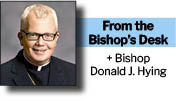
As we celebrate Labor Day, our thoughts may turn to the end of another seemingly short summer with its more relaxed pace and to the beginning of school and the start-up of everything that goes with it.
The Church invites us on this civil holiday to also ponder the meaning and dignity of work, the fundamental task that consumes a significant portion of our energy and time.
Catholicism has developed a beautiful spirituality and profound theology of work, which is worth taking a look at, to help us better understand how our daily labor is an integral part of our faith life.
What is work
In Genesis, before the Original Sin, Adam and Eve do not have to work. The luxuriant abundance of Eden serves as a generous gift from God who provides for all of their needs.
In the tragic aftermath of their revolt against the Lord, the Almighty decrees work as part of their punishment.
“Cursed is the ground because of you; in toil you shall eat of it all the days of your life; thorns and thistles it shall bring forth to you; and you shall eat the plants of the field. In the sweat of your face you shall eat bread till you return to the ground.” (Genesis 3: 17-19)
In this Jewish context, work is a burden, not a blessing; a curse and a punishment, not an opportunity.
All of the ancient cultures thought similarly; women and slaves did the servile labor in ancient Greece and Rome.
Jesus changes all of that!
The Son of God embraces the life of a carpenter, following in St. Joseph’s trade, spending the majority of His life in the obscurity of daily work and mundane tasks.
In the mystery of the hidden years of Nazareth, God dignifies work and imbues it with significance, meaning, and purpose.
Because of this fundamental shift in understanding, the Catholic world embraced work as a part of our Christian vocation, seeing it as a precious opportunity to serve God, share in His creativity, and make a generous contribution to the common good. Monks and Nuns showed the way through their rule of life, which lifted up prayer and work as the cornerstones of a balanced and spiritual path.
The Faith and work
St. John Paul II was the first modern pope to work with his hands, laboring during the dark days of the Nazi occupation of Poland both in a stone quarry and a chemical factory.
Those harsh experiences led him to ponder both God’s noble intention for work and the abuse of that intention by human greed.
In every dictatorship throughout history, the leaders have brutalized the masses through forced and dehumanizing labor.
Reflecting on the sick ideology underlying the “Work makes you free” epitaph, which hangs over the main gate of Auschwitz, brings this point home.
The pope’s wartime experiences led him to pen one of his first encyclicals, Laborem Exercens Through Work, issued in 1981, shortly after he had been shot in St. Peter’s Square.
In it, St. John Paul lays out the fundamental principles of the meaning and importance of work.
Labor is an essential part of our human nature and vocation, not a punishment but an opportunity to make our contribution.
In offering our daily labor to God and for the salvation of the world, we participate in God’s creation, redemption, and sanctification of the world.
Everyone has both a right and an obligation to work, exercising our talents, time, and intellect to build up the common good and to serve our brothers and sisters.
The human person is the end, not the means, of all economic activity.
Therefore, workers have fundamental rights to just wages, safe working conditions, a humane work week, and the ability to organize.
They also have the obligation to do their work well and to earn the wages they receive.
History teaches us that both unbridled capitalism (think of the sweatshops in the 19th century) and Marxism (think of the Siberian gulags) do not embrace this Catholic vision of work nor the rights of workers within the economic system.
Whether you are a CEO, a nurse, an architect, a homemaker, or a farmer, consider your daily work as part of your service to God, as an opportunity to sanctify and improve the world.
Offer your work each day to the Lord and do it to the best of your ability.
Thank the Lord for the gifts of time, talent, intellect, and energy that allow you to serve Him.
When your work is routine, monotonous, or alienating, give that frustration to God as the oblation of your heart.
This Labor Day, we thank God for our brothers and sisters who work hard to serve and help us in so many ways.
I particularly thank our priests, deacons, Religious, and lay leaders in our parishes and schools who labor for the Gospel and the increase of the Kingdom of God.
May you all know the fruit and rewards of a life given away in sacrifice and love!

